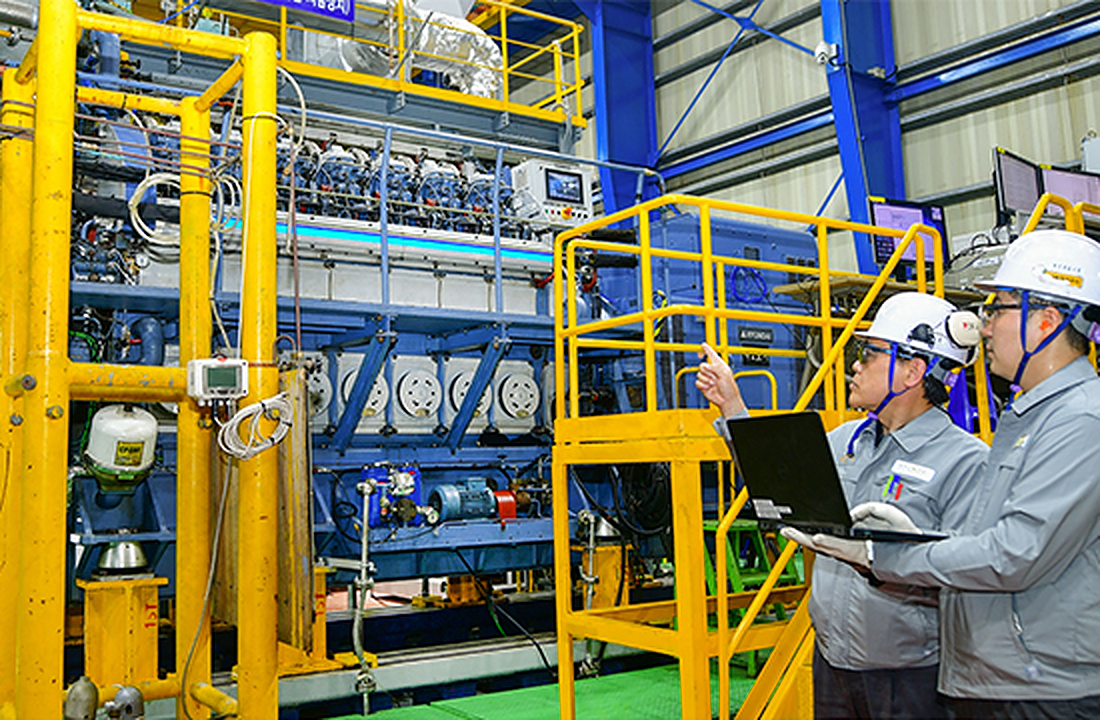Hyundai Heavy Industries has revealed that it has completed performance verifications for the 1.5 MW LNG/hydrogen hybrid engine (HiMSEN), which it developed with in-house technology. It said the engine reached “Tier 3” in a performance test, which it described as “the highest grade” under the International Maritime Organization's nitrogen oxide rules. “The scope of application of the LNG/hydrogen hybrid engine is not limited to ships,” said the South Korean group. “It is expected to be used in land-based small-scale power generation and distributed generation.”
Japan and Saudi Arabia have agreed to cooperate on carbon recycling technology and the use of hydrogen and ammonia in transportation. The agreements are part of a broader plan that covering a range of sectors, from tourism to gaming. Japanese Economy Minister Yasutoshi Nishimura also recently visited Oman, where he signed a memorandum of cooperation on carbon recycling technologies, with a focus on hydrogen, ammonia, and methanation. The agreements are part of Japan’s strategy to develop a supply chain of hydrogen and hydrogen derivatives in the Middle East.
Everfuel has revealed that HySynergy, Europe’s largest electrolyzer, has started hydrogen production. “The hydrogen was produced from the first set of electrolyzer stacks as part of the planned start-up and testing of production equipment at the 20 MW HySynergy facility in Fredericia, Denmark,” said Everfuel. The Danish company expects to start commercial production in the second quarter of 2023, with plans to develop three 100 MW sections by the end of 2025. It will then increase capacity to 1 GW by 2030.
Popular content
Arkansas, Louisiana, and Oklahoma have said that the US Department of Energy has told the HALO Hydrogen Hub, a planned regional hydrogen network, to submit a full application for the Regional Clean Hydrogen Hubs Program, in order to secure up to $1.25 billion in federal funding.
Air Liquide’s large-scale renewable hydrogen projects, ELYgator and CurtHyl, have secured support from the authorities in the Netherlands. The electrolyzer projects, each with a capacity of 200 MW, will run on renewable electricity to produce around 30,000 tons of renewable hydrogen per year.
This content is protected by copyright and may not be reused. If you want to cooperate with us and would like to reuse some of our content, please contact: editors@pv-magazine.com.


2 comments
By submitting this form you agree to pv magazine using your data for the purposes of publishing your comment.
Your personal data will only be disclosed or otherwise transmitted to third parties for the purposes of spam filtering or if this is necessary for technical maintenance of the website. Any other transfer to third parties will not take place unless this is justified on the basis of applicable data protection regulations or if pv magazine is legally obliged to do so.
You may revoke this consent at any time with effect for the future, in which case your personal data will be deleted immediately. Otherwise, your data will be deleted if pv magazine has processed your request or the purpose of data storage is fulfilled.
Further information on data privacy can be found in our Data Protection Policy.